NoF Keynotes
Keynote #1
Title: Research trends in network infrastructure, security, and management
Speaker: Raouf Boutaba (University of Waterloo, Canada)
Abstract: The advent of IoT has seen an explosive growth in the number of connected devices generating a large variety of data in high volumes at high velocities. The unique set of requirements posed by IoT demands innovation in the communication and information infrastructure to make them massively distributed for achieving scalability; secure against cyberattacks; highly interoperable for seamless interaction between different enabling technologies; highly flexible for collecting, fusing, mining, and processing IoT data; and easily programmable for service orchestration and application-enablement. This talk will discuss our experience developing and operating such an infrastructure across Canada as part of the Smart Applications on Virtualized Infrastructure project, highlighting some of the underlying management and security challenges. In particular, traditional human-in-the-loop management operations are costly, error-prone, and slow to adapt to changes. Automation can address these challenges and has been the holy grail of network management research for decades, however with limited practical deployment. We believe that the stars are now aligned to realize this long-term vision. This talk will discuss some of the research directions in this perspective with particular focus on programmable network monitoring leveraging network softwarization, predictive machine learning for automated management decision making, on-demand orchestration of network services, and IoT security empowered by blockchains.
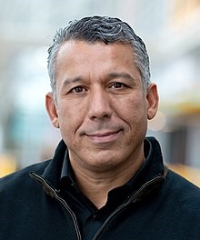
Raouf Boutaba
(University of Waterloo, Canada )
Bio: Raouf Boutaba is a University Chair Professor and Director in the David R. Cheriton School of Computer Science at the University of Waterloo. He also holds the INRIA International Chair in France. He is the founding Editor in Chief of the IEEE Transactions on Network and Service Management (2007-2010), and the current Editor-in-Chief of the IEEE Journal on Selected Areas in Communications (JSAC). His research interests are in the areas of network and service management. He has published extensively in these areas and received several journal and conference Best Paper Awards such as the IEEE 2008 Fred W. Ellersick Prize Paper Award. He also received other recognitions, including the Premierís Research Excellence Award, Industry research excellence Awards, fellowships of the Faculty of Mathematics, of the David R. Cheriton School of Computer Science and outstanding performance awards at the University of Waterloo. He has also received the IEEE Communications Society Hal Sobol Award and the IFIP Silver Core in 2007, the IEEE Communications Society Joe LociCero and the Dan Stokesbury awards in 2009, the Salah Aidarous award in 2012, the McNaugthon Gold Medal in 2014, the Technical Achievement Award of the IEEE Technical Committee on Information Infrastructure and Networking as well as the Donald W. McLellan Meritorious Service Award in 2016. He served as a distinguished lecturer for the IEEE Computer and Communications Societies. He is fellow of the IEEE, the Engineering Institute of Canada, the Canadian Academy of Engineering, and the Royal Society of Canada.
Keynote #2
Title: The application of AI to networks
Speakers: Dinesh C. Verma & Utpal Mangla (IBM, USA)
Abstract: AI and specifically Machine Learning can be used to simplify, automate and improve the operational effectiveness of many aspects of networking. However, application of AI techniques to networking domain introduces many new challenges requiring customization and adoption of AI approaches. Communications networks are highly dynamic systems, consisting of large inter-releated entities, with a complex relationships that are not conformant to any phyiscal laws. As a result, significant modifications to traditional AI techniqures are required to apply them to solve real network problems, and provide an improvement upon the current state of the art.
In this talk, we will cover the applications of AI such as Run Book Automation and/or Robotic Process Automation, creating auto-healing networks, and scaling on demand. We would also provide a deep dive into AI based network insights systems, and the lessons in the limitations of AI enablement that was revealed by this investigation. We would conclude with a discussion of the open problems in applications of AI to networking which ought to be solved by the research community.
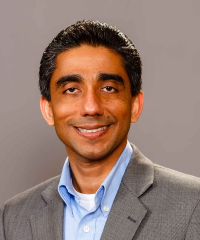
Utpal Mangla
(Vice President and Senior Partner, IBM)
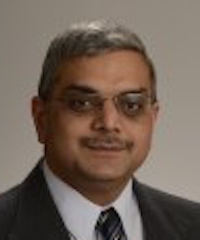
Dinesh C. Verma
(IBM Fellow, Fellow of Royal Academy of Engineering, IEEE Fellow)
Bios: Dinesh C. Verma (IBM Fellow, Fellow of Royal Academy of Engineering, IEEE Fellow) leads the Distributed AI team at IBM T J Watson Research Center, Yorktown Heights, New York. His current focus of research is AI-enabled applications for 5G cellular environments and AI-enabled management of computer and telecommunications networks. He has more than 25 years of professional experience He has authored ten books, 150+ technical papers and has been granted 185+ U.S. patents. He has chaired/vice-chaired IEEE technical committee on computer communications, as well as IEEE Internet technical committee. He has served on various program committees, editorial boards and managed large international multi-institutional government programs. He is a member of the IBM Academy of Technology, has been recognized multiple times as an IBM Master Inventor, won several IBM technical awards, including designation as an IBM Fellow, the highest technical recognition within the company. He has made seminal contributions to several areas in computer networks and is known for his work on Quality of Service management in computer networks and Policy-based Networking. He has contributed to several IBM products and service engagements including significant contributions to server networking stack, network management products, and customer projects related to cellular network analytics. Currently, Dinesh is responsible for defining the IBM strategy in the area of edge computing for IBM worldwide research. He is the Principal Investigator for the International Technology Alliance in Distributed Analytics, a group of 15 academic, industrial, and government research organizations in the U.S. and UK looking at the challenges in analytics and cognitive computing tasks in a federated multi-organization environment. More details about Dinesh can be seen at ibm.biz/dineshverma.
Utpal Mangla ( MBA, PEng, CMC, ITCP, PMP, ITIL, CSM ) is a Vice President and Senior Partner in IBM. He is the Global Leader of IBM’s Telecommunications, Media and Entertainment (TME) Industry’s Center of Competency. In addition, he leads the ‘Innovation Competency’ focusing on AI, 5G EDGE, Hybrid Cloud, and Blockchain Innovations for TME clients worldwide. In his role as a senior executive in the business and thought leader in emerging technologies, Utpal’s mission is to fuel growth by building, selling, and implementing differentiated competitive market service solution offerings to meeting critical business imperatives of our customers
Keynote #3
Title: The Coherent (R)evolution: Faster, Longer, and Soon (Almost) Everywhere?
Speaker: João Pedro (Infinera, Portugal)
Abstract: Often the unsung hero of the ICT ecosystem, optical networking has been critical to sustain our increasingly hyper-connected society, carrying on its shoulders terabits of long-distance traffic. Underpinning the last decade of cost-effective capacity growth in optical networks is coherent technology, which has found its path from high-end applications, such as submarine and continent-wide networks, down to higher-volume, lower-cost metropolitan networks. Access networks are now the remaining stronghold before coherent becomes truly pervasive. This talk will provide an overview of recent milestones in optical networking and coherent technology, highlighting what to expect in the short to medium term and the key challenges when looking further ahead.
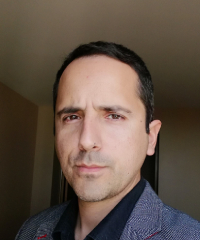
João Pedro
(Infinera, Portugal)
Bio: João Pedro holds a M.Sc. and Ph.D. degree in Electrical and Computer Engineering from Instituto Superior Técnico (IST), University of Lisbon, Portugal. He was a research engineer and a system architect at Nokia Siemens Networks and Coriant and he is currently a senior manager at Infinera, being responsible for the design of capacity planning algorithms for next-generation optical and multi-layer networks and supporting performance and techno-economic investigations of future-looking architectures. He holds 6 patent applications and has co-authored over 200 publications in international conferences and journals. He has also participated in several EU-funded projects and has been a lecturer of courses on network planning and transport networks. His current research interests include high capacity and flexible optical networks, routing and spectrum assignment, multilayer optimization and machine learning applications.
ResNed Keynotes
Keynote #1
Title: New Challenges and Solutions to Network Resilience: A Practical Approach
Speaker: Jorge Carapinha (Altice Labs, Portugal)
Abstract: Communication networks have become a critical tool to guarantee the normal operation of businesses and activity sectors. The experience of disruption events in communication infrastructures has demonstrated the importance to avoid, or mitigate, the respective effects, especially if mission-critical services are involved. In the last few years, communication network technologies have undergone profound changes: network virtualization, network programmability, slicing, edge computing, AI/ML are examples of evolutions that had a significant impact on design, operation, management and control of communication networks. 5G can be seen as a convergence point of these evolution trends and the catalyst for a widespread acceptance and adoption by the industry and users at large.
Inevitably, network resilience and reliability need to be reassessed in the light of the challenges and opportunities raised by the new technological environment. In particular, 5G standardization has devoted attention to this topic, through the definition of the URLLC (Ultra-Reliable Low Latency Communications) service category, aimed at providing a solution for challenging use cases such as factory automation, autonomous driving, smart grid or robotic healthcare solutions.
This keynote will provide a general overview of emerging directions for communication technologies, and how they will shape reliability and resilience of future networks. Activities in this field conducted by Altice Labs and respective lessons learned will be presented.
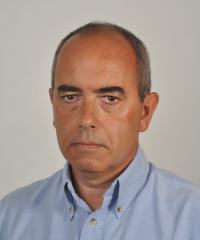
Jorge Carapinha
(Altice Labs, Portugal)

Jorge Carapinha
(Altice Labs, Portugal)
Bio: Jorge Carapinha graduated in Electrical and Computer Engineering in 1984 from the University of Coimbra and received the MSc in Electronics and Telecommunications in 1998 from the University of Aveiro. He has been with Altice Labs (formerly Centro de Estudos de Telecomunicações and PT Inovação) since 1985 and has a long experience in technical areas such as Conformance Testing, IP/MPLS Technologies, and Services, Quality of Service, and Network Virtualization. He has a long record of participation in international collaborative research projects in the framework of European R&D programs, namely IST, ACTS, FP7, Eurescom, and H2020, some of which is a leading role. Lately, his fields of interest have been mainly focused on Cloud Networking, Software Defined Networking, Network Automation, Edge Computing, Network Slicing, and 5G. He is currently coordinating the Portuguese 5G experimental facility site, in the framework of the 5G-PPP 5G-VINNI project. He has been involved in relevant standardization initiatives, e.g. ETSI NFV ISG. He has authored or co-authored technical papers published in major technical and scientific journals or conferences and has also collaborated regularly as a reviewer of relevant technical publications.
Keynote #2
Title: Designing and Operating Content Aggregation & Content Delivery Networks in scenarios of high availability and high resilience – A Broadcasting perspective of the Tokyo 2020 Summer Olympic Games.
Speaker: Mario Reis (Olympic Broadcasting Services, Spain)
Abstract: With the world’s TV viewers cooped up for a year and spectators barred from attending, never has there been a more pressing need for the International Olympic Committee (IOC) to put on the greatest sport show on Earth.
The host broadcaster, the IOC-owned Olympic Broadcasting Services (OBS), has been experimenting with new digital technologies over successive Games and this year it will unleash most of them. It promises a visual and data-rich feast in which IP, cloud, 5G and AI are all breaking the conventional frame of broadcast production and transforming the fundamentals of content delivery and viewers’ experience. The ambition is to deliver “the most realistic experience one can get from viewing a sporting event without actually attending in person”.
OBS plans to produce 9500 hours of content in just over two weeks (of which 3800-4000 hours will be live). It includes 118 HD contribution multilateral feeds, 68 UHD contribution multilateral feeds, 76 HD distribution feeds and 44 UHD distribution feeds, including more than 1,000 camera systems and 3,600 microphones.
To deliver this content across the globe, OBS put in place an OTN delivering above 2 Tbps of capacity from the International Broadcasting Center located in Tokyo. This network is the spine for all the additional networks (IP, Satellite) and the associated Service Layer (High Definition and Ultra High Definition with HDR and 5.1.4 immersive audio, (Over-The-Top) (OTT) delivery, short-form content, multi-clip feeds, …). In this workshop we will be tackling on how OBS together with its partners, designs and operates the telecommunications networks put in place for the aggregation and distribution of content and related data during the Olympic Games so to ensure a smooth and immersive experience to all the sport fans around the globe. Fault tolerance and permanent availability are key requirements. Design strategies will be shared, and business continuity/disaster recovery scenarios will be addressed.
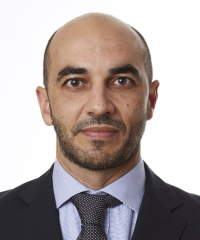
Mario Reis
(Director of Telecommunications & OTT at Olympic Broadcasting Services)

Mario Reis
(Director of Telecommunications & OTT at Olympic Broadcasting Services)
Bio: In Olympic Broadcasting Services (OBS) since 2010, Mario Reis is the Telecommunications and Over-The-Top (OTT) director. He is in charge of the telecommunication networks supporting both Content Aggregation and Content Distribution. Since 2014, took over the development of the OBS OTT platform designed with a special focus on live broadcasting and sports data visualization. From 2018 is in charge of cloud adoption and development for broadcasting-related workflows and did launch the OBS Cloud service. Recently, is leading the 5G case development for Live Sports broadcasting and production, with the aim to bring into service during the upcoming Winter Games taking place in Beijing in 2022.
Before joining OBS, he did spend 10 years in Nokia Networks, leading both mobile networks design and optimization with exposure in the Americas and Europe. The last years within Nokia hold several positions in the systems integration and consulting business unit in the areas of provisioning, BSS, OSS, and network planning.
Keynote #3
Title: Towards Structural Resilience of Next Generation Cellular Networks
Speaker: David Tipper (University of Pittsburgh, USA)
Abstract: Future cellular networks will be built around supporting both people and things with dynamic composable services. The vision is that of mobile network infrastructure as a service leveraging software defined networking, mobile edge-to-cloud computing and ubiquitous virtualization to provide customized network slices with performance guarantees on demand. This vision is enabled by a range of new technologies such as configurable multi-band transceivers, flexible spectrum management, cell free massive MIMO, mobile edge computing, AI/ML based network management, and reconfigurable intelligent surfaces to control radio propagation, to name a few. While the new technologies will undoubtable expand the range of services and support new unimagined applications, they will increase dependence on these networks which will require greater resilience than current networks can provide. In this talk we survey potential techniques that can leverage the new cellular network technologies to provide self-adaptation to support high levels of resilience in the face failures and attack. Furthermore, we provide a framework for to provide dynamic resilience estimates and adaptation and outline open research problems to achieve resilience goals.
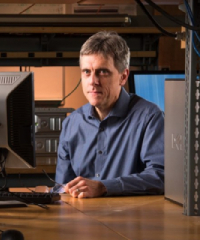
David Tipper
(University of Pittsburgh, USA)

David Tipper
(University of Pittsburgh, USA)
Bio: David Tipper is a Professor in the Department of Informatics and Networked Systems in the School of Computing and Information at the University of Pittsburgh. He was Director of the Graduate Telecommunications and Networking Program at the University of Pittsburgh from 2007 to 2014. He is a graduate of the University of Arizona (Ph.D., MS) and Virginia Tech (BS). His current research interests are resilient critical infrastructures, network design, time-varying performance, and reliability analysis techniques. His teaching and research have been supported by grants from corporate and government organizations such as NIST, National Science Foundation, Army Research Office, AT&T Foundation, and IBM.





